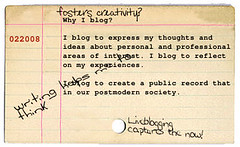How I use a blog in my research and writing
By Kristopher A. Nelson
in
May 2011
900 words / 5 min.
Tweet
Share
As someone who does not blog to earn money (I like to pay my hosting fees, but that’s only because I’m a poor grad student), I thought I’d run through how and why I blog, and why I find it a critical part of my “real” work of academic research and writing.
Please note that this post is from 2011. Evaluate with care and in light of later events.
There are many (non-exclusive) reasons to blog: money, fame, narcissism, SEO, product placement and advertising, journaling, self-discovery, passion… The specific reasons for blogging are as varied as bloggers themselves, and arguments about whether one should be blogging at all are equally diverse, especially since so many bloggers give up in frustration because their audience is so small. But a small audience is only a problem for certain kinds of blogging, of course, most especially blogging for dollars (or euros, shekels, or pounds).
As someone who does not blog to earn money (I like to pay my hosting fees, but that’s only because I’m a poor grad student), I thought I’d run through how and why I blog, and why I find it a critical part of my “real” work of academic research and writing. (If you are looking for how to make money blogging, there are better sources out there.)
Why I Blog
I blog primarily for three reasons, in increasing order of importance: (1) to give me a visible presence on the Internet for my (potential) colleagues and students to see my work; (2) to get feedback, not all of it visible on my blog; (3) to capture interesting and potentially fruitful Internet finds (i.e., as part of my research–which is mostly online anyway these days); and (4) as a rough-draft medium that I can draw on when eventually need to actually produce a piece of writing.
(Oh yes, and because I enjoy it.)
Like many personal bloggers, I sometimes use my blog to capture interesting finds. More often, I try to integrate this with my primary purpose, and turn my research immediately into writing by creating short articles about my finds. That way I have ready-made rough-draft material to work from when I go to write. For those who may primarily focus on this purpose, a so-called “tumblelog” like Tumblr or Posterous (both of which I use from time to time) may be the ideal blogging service.

Making myself visible on the Internet may be a form of vanity, but it’s increasingly important to “brand” oneself today. I want colleagues, students, employers, etc. to be able to find me and get insight into my professional persona easily, and I want them to see what I produce. It also helps connect me to various larger communities, including academics, other bloggers, lawyers, and so on. It’s a networking tool that doesn’t need to be awkward or self-aggrandizing.
Feedback is useful, though comments may or may not be. Sometimes this comes in the form of blog comments, sometime in terms of email, and more often it gives me a medium in which to share my drafts with “real-life” colleagues. The more readers you have, of course, the more feedback you might potentially get–but that isn’t my primary purpose, so I don’t care so much about raw numbers of visitors.
How I Blog
My most important reason for blogging (use as a rough-draft medium) has developed into the primary driver of my methodology. So, while I do sometimes simply capture the barest details about new publications or interesting articles, more often I use other tools for that purpose: Google Reader or TBUZZ to Twitter to Delicious via Packrati.us and Pinboard, or Read It Later or Instapaper.
I’ve realized, though, that simply capturing lots of small amounts of information in the blog medium is less useful for me than writing fewer, longer write-ups. Spending more time on each potential source, writing up a more detailed and in-depth analysis or reflection provides me with effective, highly useful material when I need to write an article later.
This kind of writing is in-between the quick summaries or reactions of Twitter or a tumblelog, but less detailed, analytic, or proof-read than a true article. These are more like the “reflection” assignments I give my undergraduates, and are intended not so much for consumption by others as they are to capture analytic ideas and details that may help me later. The focus is not on perfection, which makes writing them easier, but I do try to have an audience beyond myself in mind, which vastly increases their reusability.
What does this look like? Try posts like the following–none are perfect, but they’ve all proved useful later:
- Judge Noble Hand hints at the move from property to people
- An argument for the “Inviolability of Telegraphic Correspondence”
- Smallpox inoculation and quarantine in colonial America
Obviously, this approach is not right for everyone, but for anyone who needs to produce written work (that doesn’t need to be secret!), it’s wonderful, practical, and (relatively) easy.
Conclusion
So there you go. I blog mostly so I don’t have to stare at a blank page later, and to a lesser extent so that I can be found online. (Also I like tech.) If you do decide to blog, I highly recommend you think about the why and the how for yourself.
Related articles
- 10 Reasons for a Law Student to Blog (inpropriapersona.com)
- Friday Question: Why do you blog? (worldmomsblog.com)
- Writing For Blogs – Style, Strategy, Voice: Webinar recording now available (kevin.lexblog.com)


